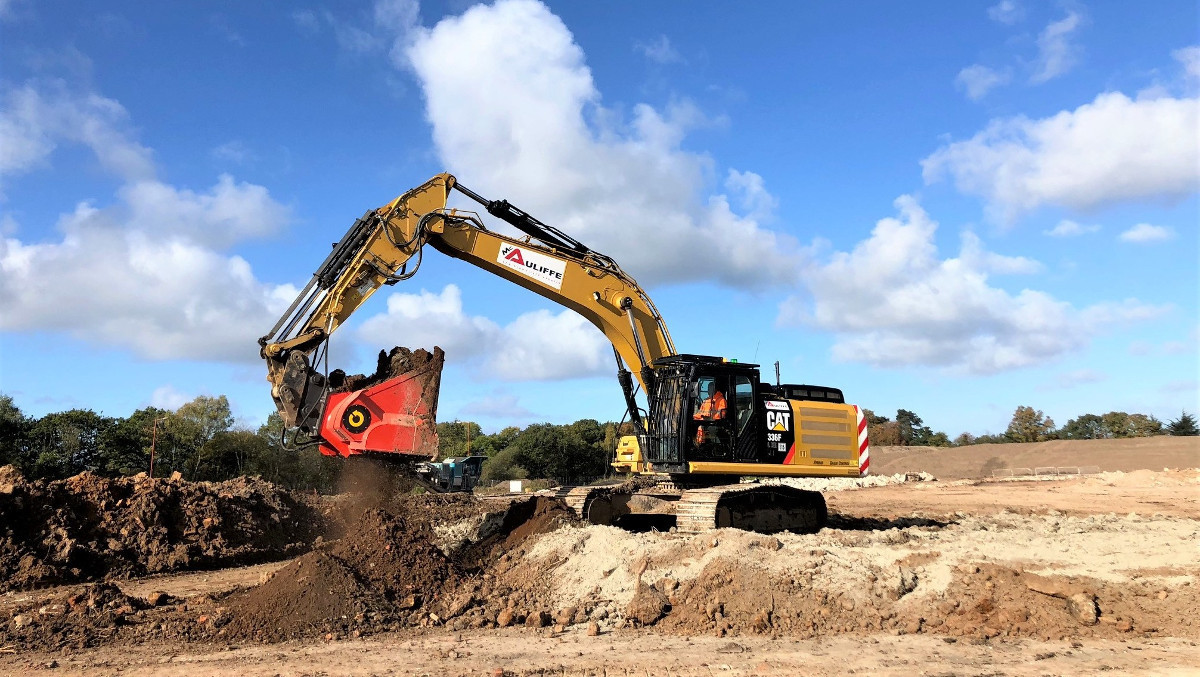
The UK is currently facing a major housing shortage, with the lack of readily available land suitable for construction being a major factor in holding back developments. This has directly led to the more remediation projects being undertaken, with Wolverhampton headquartered McAuliffe working on developments throughout the UK. In its work, the company has found an Allu DH series Transformer attachment to be an invaluable tool for processing materials during the development of brownfield sites previously classified as contaminated land.
Established almost 50 years ago, McAuliffe initially began work on new builds, major roads, sewers and bulk earthwork projects. In the mid-1980s the company ventured into the reclamation and remediation of brownfield sites, working on a former landfill site in Solihull and the former Land Rover works in Birmingham. McAuliffe then secured the Tipton Gas Works contract in the late 1980s, a highly complex project in the heart of the Black Country, West Midlands. Since the 1980s and 1990s, large construction companies have come to rely on McAuliffe’s trusted know-how in providing highly specialist and professional regeneration and remediation services. This list includes many of the UK’s leading housebuilders and property developers, such as Barratt, Bloor, Bovis, Redrow and Persimmon Homes.
Specialists in remediation
Working with its clients from an early stage, McAuliffe can help to establish the likely costs, timescales and potential methods for land remediation. A critical aspect to all remediation projects is the initial site investigation, subsequent risk assessments and remediation strategy. Sadly it is common place, particularly on complex sites, for inadequate site investigations to be carried out, which leads to inadequate or over scoped remediation strategies. Not only does this involve unnecessary costs, but can lead to disputes with regulators leading to potential significant delays to the project by months and sometimes years.
To help avoid these pitfalls, McAuliffe provides advice on abnormals at land purchase stage and a range of remediation technologies to suit individual project requirements. These include ex-situ soils treatment, soil stabilisation / solidification, in-situ groundwater treatment, waste pre-treatment for disposal, tank decommissioning / liquid disposal, concurrent concrete and foundation removal. Through the provision of such services, McAuliffe can deliver best value, measured by cost, time, quality and sustainability.
Transforming project work
As a specialist environmental contractor, McAuliffe has amassed a large fleet of equipment in order to service the requirements of its customers. Thus the company now operates an extensive range of Blue Machinery supplied Powerscreen crushers and screeners, for the mobile processing and recycling of materials found on brownfield sites. Another piece of equipment (also supplied by Blue Machinery), albeit on a smaller scale, but still vital to McAuliffe’s business, are Allu Transformers.
McAuliffe is a long time beneficiary of the attributes of Allu technology, having owned and operated an Allu SM attachment for over ten years. The attachment had been specifically useful on a variety of remediation projects, and still has proved to be a highly reliable and effective tool to the present day. Its success led directly to the company using attachments from other manufacturers, but much preferred the attributes of the Allu Transformer, leading them to once again use Allu when it came to choosing a new and modern processing attachment.
Through its excellent relationship with Blue Machinery, McAuliffe was made aware of some of the latest developments in Allu technology, leading to the company upgrading to an Allu DH4-17 X75 Transformer. This has exceeded all expectations, comfortably undertaking highly productive work on some of the wettest and stickiest materials to be found. Now both the Allu attachments can be seen working together throughout the UK, providing a solution to some of the hardest to deal with materials imaginable.
The Allu DH series Transformers themselves are a range of screening attachments for compact base machines. They are suitable for excavators up to 45t, loaders up to 30t, as well as being suitable for tractors and backhoe loaders. The DH attachments are ideal for waste material handling and environmental remediation applications, as well as general construction and demolition. Being highly mobile, they enable work to be undertaken directly on site, often in the hardest to get to areas.
How it works
The Allu DH series Transformers are part of Allu’s D series of attachments purpose designed for processing heavy duty-hard wearing materials such as soil, clay, concrete and bricks. The range has proved its value in various business activities including waste material handling, composting, pipeline backfilling/padding, clay stabilising job sites, crushing asphalt and minerals. In each case the equipment has effectively transformed operations wherever it has been used.
Material is transformed as the DH, as with all members of the Allu D series, comprises of an excavator/ loader/ tractor mounted attachment which screens, crushes, aerates, blends, mixes, separates, feeds and loads materials. This results in the feed material being effectively transformed into highly valuable products, making businesses more efficient, and more profitable. At the heart of the attachment is the unique top screen of its bucket. This is where the screening blades spin between the top screen combs, with the end material size being defined by the space between the combs. Effectively these screening combs carry most of the material weight to ensure the drums and bearings take on less impact and load. This construction is clog-free and maintains good capacity even with wet materials.
McAuliffe’s DH series Transformer has now been fitted with Allu’s X75 blades. This has led directly to the attachment being used in an aeration process to remove the larger hard core for processing with a crusher, whilst drying the wetter material at the same time. McAuliffe then uses a variety of different processes to deal with contamination, including adding microscopic organisms to break down contaminants as well as adding lime for ground stabilisation.